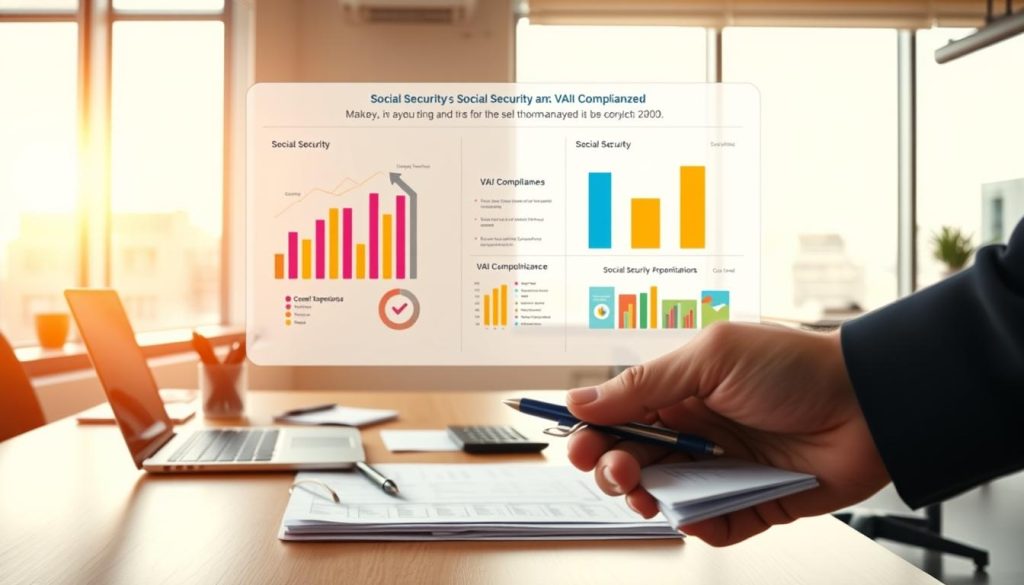Imagine this: You’ve just landed your biggest client yet. The thrill of independence fuels your days, but as tax season looms, uncertainty creeps in. How much should you set aside? What deductions apply? You’re not alone—over 12% of France’s workforce shares this balancing act between creative freedom and fiscal responsibility.
We’ve crafted this guide to transform confusion into confidence. Whether you’re a graphic designer in Paris or a consultant in Lyon, understanding your obligations unlocks opportunities. The French system rewards those who plan wisely—let’s turn compliance into your competitive edge.
This isn’t just about avoiding penalties. Strategic management of income and contributions builds resilience. With 1 in 8 professionals now self-employed, clarity becomes your greatest asset. We’ll simplify complex regulations so you can focus on what matters—growing your business.
Table of Contents
Key Takeaways
- France’s self-employed workforce faces unique tax challenges requiring tailored solutions
- Proper planning converts fiscal obligations into financial growth opportunities
- Social security contributions impact both short-term cash flow and long-term stability
- Dedication to compliance strengthens professional credibility and business longevity
- Strategic income management creates buffers against economic fluctuations
Introduction: Navigating France’s Tax Environment for Freelancers
The freedom of self-employment in France comes with a crucial responsibility: mastering your fiscal landscape. Our team guides professionals through this dynamic system, where strategic choices directly impact financial stability. Recent reforms have reshaped opportunities for optimizing obligations while maintaining compliance.
Adapting to Fiscal Flexibility
France’s framework offers multiple structures for reporting earnings. Selecting between regimes like micro-entrepreneur or traditional models affects your yearly contributions and deductible expenses. We’ve observed clients increase net income by 18-34% through informed regime selection.
Your business category determines key obligations. Service providers face different rules than product-based ventures. Recent legislative updates introduced simplified deductions for digital workspaces and eco-friendly investments. Timely adaptation to these changes protects profits while aligning with national priorities.
Three factors demand attention:
- Projected annual revenue thresholds
- Social charge calculation methods
- Long-term growth objectives
Regular reviews ensure your approach evolves with market shifts. Our analysts recommend quarterly check-ins to capitalize on emerging opportunities. This proactive stance transforms fiscal management from reactive compliance to strategic advantage.
Taxation for Freelancers: Key Concepts and Definitions

Understanding key financial concepts transforms uncertainty into strategic advantage. For self-employed professionals in France, clarity begins with two pillars: income calculations and legitimate cost reductions. Let’s demystify the terminology shaping your fiscal journey.
Understanding Freelance Income Tax
Operating as a sole trader (entreprise individuelle) merges your personal and business finances under French law. Your earnings face the same progressive rates as salaried workers, ranging from 11% to 45%. This unified approach simplifies reporting but requires meticulous expense tracking.
Defining Allowable Deductions and Tax Credits
Business costs directly tied to revenue generation lower your taxable income. Think workspace rentals, professional tools, or client acquisition expenses. Unlike deductions, tax credits slash your final bill euro-for-euro. Recent updates expanded eligible items, including energy-efficient equipment purchases.
Three principles govern valid claims:
- Costs must be essential for operations
- Receipts must span entire fiscal years
- Personal use allocations require precise calculations
Our team recently helped a Marseille photographer reclaim 23% of her tax liability through overlooked deductions like editing software subscriptions. Proper documentation turns everyday purchases into financial leverage while maintaining full compliance.
Exploring French Tax Regimes for Self-Employed Professionals
Choosing the right fiscal structure shapes your business’s financial future. France offers distinct systems tailored to different operational scales and goals. Let’s break down how these frameworks affect your earnings and compliance.
Standard Versus Micro-Entrepreneur Regime
The standard system calculates tax on net profits after deducting actual expenses. This benefits established businesses with high operational costs. A Lyon-based web developer recently reduced taxable income by 42% through equipment depreciation claims.
Micro-entreprise simplifies calculations with automatic deductions:
- Commercial activities: 71% allowance up to €188,700 revenue
- Trade/services: 50% deduction capped at €91,900
- Professional services: 34% credit under €91,900
Regulated professions like legal services can’t use this regime. Our team compares your expense patterns against these fixed rates to identify savings.
Special Considerations for Limited Companies
SARL structures blend personal and corporate tax rules. During the initial five-year phase, owners report business income through individual returns. This transitional period requires strategic planning for eventual corporate rates.
Three factors determine optimal structure:
- Projected growth beyond micro-entreprise thresholds
- Need for liability protection
- Long-term investment plans
An optimal fiscal strategy balances immediate savings with future scalability. We help clients model different scenarios to lock in financial security while meeting all obligations.
Income Tax: Rates, Brackets, and Deduction Strategies
Effective tax planning starts with understanding France’s progressive income brackets. The system applies higher rates to portions of earnings exceeding specific thresholds, rewarding strategic financial management. Let’s explore how these tiers work and practical ways to optimize your position within them.
2024-2025 Rate Structures Explained
| Taxable Income | 2024 Rate | 2025 Rate |
|---|---|---|
| Up to €11,294 | 0% | 0% (€11,497) |
| €11,295-28,797 | 11% | 11% (€11,498-29,315) |
| €28,798-82,341 | 30% | 30% (€29,316-83,823) |
| €82,342-177,106 | 41% | 41% (€83,824-180,294) |
| Over €177,707 | 45% | 45% (€180,295+) |
This tiered approach means only income exceeding each threshold faces higher rates. A €40,000 income in 2024 pays 0% on the first €11,294, 11% on the next €17,503, and 30% on the remaining €11,203.
Maximizing Allowable Cost Reductions
Legitimate business costs lower your taxable base. Focus on these key categories:
- Workspace costs: Deduct 30% of home utility bills if 20m² is used exclusively for work
- Professional tools: Software subscriptions, equipment under €500 (full deduction in purchase year)
- Client development: 50% meal deductions during business meetings with receipts
Maintain separate bank accounts for personal and professional use. Digital tools like expense trackers simplify documentation – crucial for defending claims during audits. For complex scenarios, our tax implications guide offers detailed strategies.
Remember: Deductions require proportional justification. A 10m² home office in a 100m² apartment can only claim 10% of related expenses. Systematic tracking turns everyday costs into financial advantages while maintaining full compliance.
Social Security Contributions and VAT: Essential Considerations for Freelancers

Managing financial responsibilities requires balancing immediate needs with long-term protections. Two pillars form this foundation: mandatory social charges and value-added tax compliance. Mastering these elements ensures operational continuity while safeguarding your professional future.
Calculating Social Security Obligations
France’s social security system requires all independent workers to contribute based on earnings. Rates vary by activity type:
- 12.8% for sales-related work
- 22% for commercial and professional services
The ACRE initiative helps new businesses by halving these rates during their first operational year. This temporary relief provides breathing room while establishing client bases.
Contributions fund six critical protections:
- Healthcare coverage
- Parental leave support
- Disability benefits
Accurate calculations prevent underpayment penalties. Quarterly prepayments based on projected income help manage cash flow effectively.
Understanding VAT Registration and Compliance
VAT thresholds determine when registration becomes mandatory:
- €34,600 for service providers
- €86,900 for product sellers
Standard TVA rates stand at 20%, with reductions for essentials like books (5.5%) and medicines (2.1%). Proper documentation separates taxable and exempt transactions, crucial for accurate filings.
Digital reporting tools streamline declaration processes. Monthly or quarterly filings depend on revenue levels. Staying below thresholds allows exemption but limits input credit recovery. Strategic registration timing can enhance financial flexibility for growing ventures.
Filing Your Tax Returns: Processes, Deadlines, and Penalties
Submitting annual declarations marks a critical checkpoint for maintaining financial health. France’s system rewards punctual filers while penalizing delays harshly. Let’s simplify the roadmap for stress-free compliance.
Step-by-Step Registration and Filing Procedures
Begin at the Centre de Formalités des Entreprises (CFE). Your business type determines required documents:
- Service providers submit ID proofs and activity codes
- Commercial ventures add trade registry extracts
Online filing dominates modern practices. Key 2025 deadlines:
| Département | Postal Deadline | Online Deadline |
|---|---|---|
| 01-19 | May 20 | May 29 |
| 20-49 | May 20 | June 2 |
| 50-976 | May 20 | June 5 |
Standard regime filers use form 2035 for detailed expense reporting. Micro-entreprise operators complete 2042C with simplified calculations.
Tips to Avoid Late Filing Fines and Penalties
Missed deadlines trigger immediate 10% penalties. Follow these safeguards:
- Set calendar alerts 15 days before due dates
- Upload receipts monthly using cloud storage
- Verify département-specific cutoff times
Corporate filers face stricter rules: submit within three months of fiscal year-end or by April 30. Quarterly prepayments reduce year-end surprises while demonstrating compliance commitment.
Organize documents using labeled folders for each tax category. Digital tools like Declarando auto-populate forms from bank feeds. This system cuts preparation time by 65% while minimizing errors.
Leveraging Professional Advice and Digital Tools for Tax Efficiency
France’s financial landscape becomes manageable with strategic support systems. Specialized services like Elitax and French Tax Online simplify compliance for international professionals. Over 68% of self-employed workers report reduced stress when combining expert guidance with modern software solutions.
Selecting Financial Partners
Credentials matter more than language skills when choosing advisers. Verify certifications like Expert-Comptable status through France’s official registry. Bilingual professionals at firms like Accounteo bridge communication gaps while ensuring local regulation mastery.
Optimizing Digital Solutions
Modern platforms transform complex calculations into automated workflows. Try these resources:
- Service-Public.fr: Government website with multilingual tax guides
- QuickBooks Self-Employed: Tracks deductible expenses in real-time
- Impôt.Gouv: Direct online tax filing portal
Schedule quarterly reviews with your account manager to align tools with business growth. This dual approach turns regulatory compliance into strategic advantage – letting you focus on client work rather than spreadsheets.
FAQ
What’s the difference between standard tax regime and micro-entrepreneur status?
The micro-entrepreneur regime offers simplified reporting and flat-rate deductions (up to 34% for services), while the standard regime requires detailed expense tracking but allows actual cost deductions. Micro-entrepreneurs benefit from lower social charges but face revenue ceilings (€34,400 for services).
How do I deduct home office expenses as a freelancer?
You can claim a portion of rent, utilities, and internet costs based on workspace size or usage time. For precise calculations, use the URSSAF’s pro-rata tool or consult an accountant. Keep all receipts for at least three years.
When am I required to register for VAT in France?
VAT registration becomes mandatory if your annual revenue exceeds €34,400 for services or €85,800 for goods. Micro-entrepreneurs are exempt unless they voluntarily opt in. Always monitor your earnings to avoid compliance gaps.
What deadlines apply to freelance tax filings?
Online declarations are due by late May (exact dates vary yearly), while paper forms must be submitted earlier. Social security payments follow monthly or quarterly schedules. Set calendar reminders to prevent penalties (5%–10% of owed amounts).
Can I reduce social security contributions legally?
Yes. Contributions drop from 22% to 11% after three years under the ACRE scheme for new businesses. Pension and health insurance payments also qualify for income tax deductions. Strategic planning with a certified adviser maximizes savings.
How do I choose between accounting software and a professional accountant?
Use tools like QuickBooks or Zervant for basic bookkeeping if revenue stays below €70,000. Hire a expert-comptable for complex cases (multiple clients, international work, or VAT management). Many freelancers combine both for cost efficiency.
What penalties apply for late tax payments?
Late submissions incur a 10% surcharge plus 0.2% monthly interest. Repeated delays trigger audits. If you anticipate issues, request a payment plan via impots.gouv.fr to avoid credit score impacts.
Are professional training costs tax-deductible?
Yes. Courses, certifications, and conference fees directly related to your services qualify. Save invoices and program descriptions. Under the micro-entrepreneur regime, these reduce taxable income via the 34% allowance.





